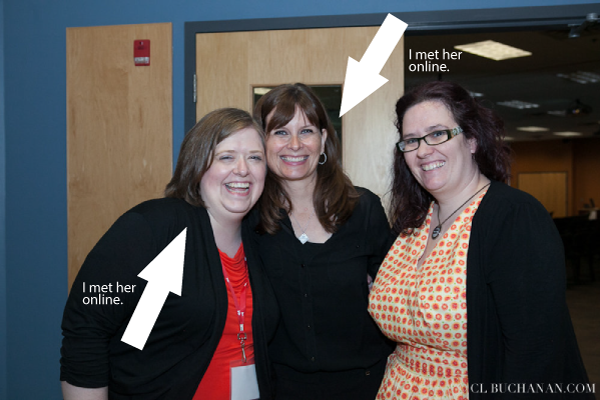In my professional life, engagement has been a buzz word for years for various reasons depending on the industry. Right now, I do a great deal of work in social media both personally and professionally and everybody talks about the importance of engagement. Not everyone understands how to do it well, though. This lack of understanding is particularly troublesome when you take the context of engagement "offline".
 Source: CL Buchanan Photography
Source: CL Buchanan PhotographyThis past weekend, I attended
Blissdom Canada, a writing and business conference that focuses on social media, marketing, public relations and blogging. Blissdom is geared toward females in this realm and, as such, attracts sponsors who gear their products toward females. Primarily food, travel, family vehicles, children's toys and household products. While I would personally
love to see more tech industry brands represented, I recognize that there's a great divide between female-oriented conferences that always seem to be geared to the "mommy blogger" and other conferences that have a general audience. That's a discussion I could get into here, but I'll refrain for now. I have a few things I'd like to say to brands at conferences based on my first-hand experiences and second-hand stories (from a variety of conferences, not just Blissdom Canada).
1) Know what your goals are and why you're at the conference. When I walk up to you and say hello, I'd love to hear something from you. I'm not just walking by your booth to take what I can get. Now, if you had a stack of iPads, I
might be tempted to grab and run but most of you don't have said iPads so get my attention another way. I happen to be a blogger who hasn't worked with brands very much and I don't seek out that relationship. So, why should I talk to you, try your product or potentially write about it? Having an awkward 20 seconds as I pass by on my way to the next booth means I'm going to forget about you even though you handed me a bag with your logo on it.
2) If you want to give away "swag", make it meaningful, useful and audience appropriate. There were several food companies at Blissdom Canada this year. Every last one of them showed and gave away products that are or can be controversial to various segments of the population, but most particularly among health-conscious mothers. Other brands handed a pile of paper or promotional items to visitors. All of this in the name of getting
their name out there. To get noticed. To get exposure. I wonder how many of my fellow conference attendees made a generous addition to their recycling bin and the landfill today with these things they can't really use or don't want. (I vow here and now that the first brand I feel comfortable giving an endorsement
and who does an eco-friendly promotion at a conference is getting a blog post from me - no strings attached to it.)
3) The Golden Rule is the best practice for booth staffing. I heard from countless people about a staffperson who was repeatedly rude or short with visitors. While I understand that a crowd around your booth can be overwhelming and your booth activity might be keeping you far busier than expected, staff should always be courteous to visitors and not treat them poorly. Here's why: I may not know that staffperson's name, but I know your brand name.
4) Social media conference engagement starts and ends online - before, during and after. Yes, you have a physical presence at the conference. Of course you're busy talking to the stream of people flooding your booth at all times of the day. Don't forget to check your twitter and facebook accounts. Attendees will interact with you during sessions and overnight when they have questions and comments. Be sure you have resources to stay just as engaged online as you are face-to-face.
5) Don't let the connection you made die: Follow-up. I've been the brand at conferences before. I know how busy it is when you get back to the office and work piled up while you're gone, in addition to all the new work generated by all the conversations you had at the conference. If you don't follow-up within the first two days after the conference, the adrenaline rush is going to fizzle out and your opportunity to engage potential influencers will vanish. When visitors finally get your email a week, two weeks, six months later it won't generate nearly the enthusiastic response you'd get if you sent it within the first two days to a week.
Reaching out to bloggers is an effective and efficient way to reach a targeted market with information about your product and services. As the marketing world catches on to just how valuable a relationship with bloggers can be, the brands who do that interaction right will stay ahead of the game in terms of their reach. The ones who don't will continue to rack up missed opportunities that will make them question the value of social media. The key to doing this right is to engage, engage, engage. It isn't about
selling to your connections. It's about developing a relationship online and off.
 I’ve met a ton of people from online in “real life”One of my biggest pet peeves is that people think that all real life personal connections have been lost with the advent of new online social channels. They believe that mass numbers simply hide behind a screen constantly, becoming anti-social.
I’ve met a ton of people from online in “real life”One of my biggest pet peeves is that people think that all real life personal connections have been lost with the advent of new online social channels. They believe that mass numbers simply hide behind a screen constantly, becoming anti-social.


